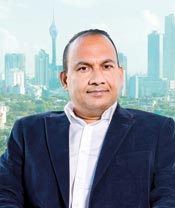Sri Lanka’s apparel manufacturing seeks state policy support
View(s):
Mr. Sahan Rajapakse
Asserting the importance of vertical integration, the Fabric and Apparel Accessory Manufacturers Association (FAAMA) has said that 50 to 60 per cent of Sri Lanka’s fabric requirement is imported.
This dependency on imports prolongs the industry’s lead times and impedes its ability to enhance speed and embrace agile models. Notably, over 40 per cent of these imports consist of cotton, while 70 per cent are made up of synthetic materials.
FAAMA is the governing body of fabric and apparel accessory manufacturers of Sri Lanka and a subsidiary of the Joint Apparel Association Forum (JAAF). The association has over 40 member companies and is the unified voice for the apparel industry’s supply chain, aiding fabric and apparel accessory manufacturers to identify opportunities and work towards improving logistics, policies, and infrastructure, according to FAAMA chairman Sahan Rajapakse as stated in a media release
He stressed that bringing in supply chains within domestic factories will help reduce lead times and allow Sri Lanka to compete with countries that already have well-established vertical integration. “Countries such as China, Vietnam and Bangladesh all have vertical integration in place. Having this vertical integration will allow investors to develop the product organically within the local supply chain, resulting in reducing freight charges.”
He reiterated that the fabric and cotton fabric industry have great potential for vertical integration. Currently, 40-50 per cent of the required resources are supplied by companies like Hayleys Fabric, Teejay and Ocean Lanka. The industry’s speciality is the value-added market in terms of the functionality of the fabric.
The fabric and apparel accessory manufacturing industry is also in dire need of government policy support given that it continually battles high electricity and water tariffs which have increased industry operational costs. Mr. Rajapakse also highlighted the adverse impact, of abolishing the Simplified Value Added Tax (SVAT), on the industry including jeopardising the cash flow of businesses. “With the increase of documentation and costs, investors will be discouraged from entering Sri Lanka.”
The industry also sees immense potential for partnerships through foreign direct investment to capitalise on know-how on product and machinery development. “The industry has not had much investment in the past few years,” states Mr. Rajapakse. “Improving Sri Lanka’s investment environment can certainly be a tool in strengthening Sri Lanka’s fabric and apparel accessory manufacturing industry and its supply chain.”
He added that expanding the market footprint is an absolute necessity for the industry to maintain product quality and competitiveness. “The US market should be an industry goal while attempting to reach the skilled and ever-evolving markets of China and India. The industry must hold innovation at its core in export diversification and lead through innovation.”
Hitad.lk has you covered with quality used or brand new cars for sale that are budget friendly yet reliable! Now is the time to sell your old ride for something more attractive to today's modern automotive market demands. Browse through our selection of affordable options now on Hitad.lk before deciding on what will work best for you!


